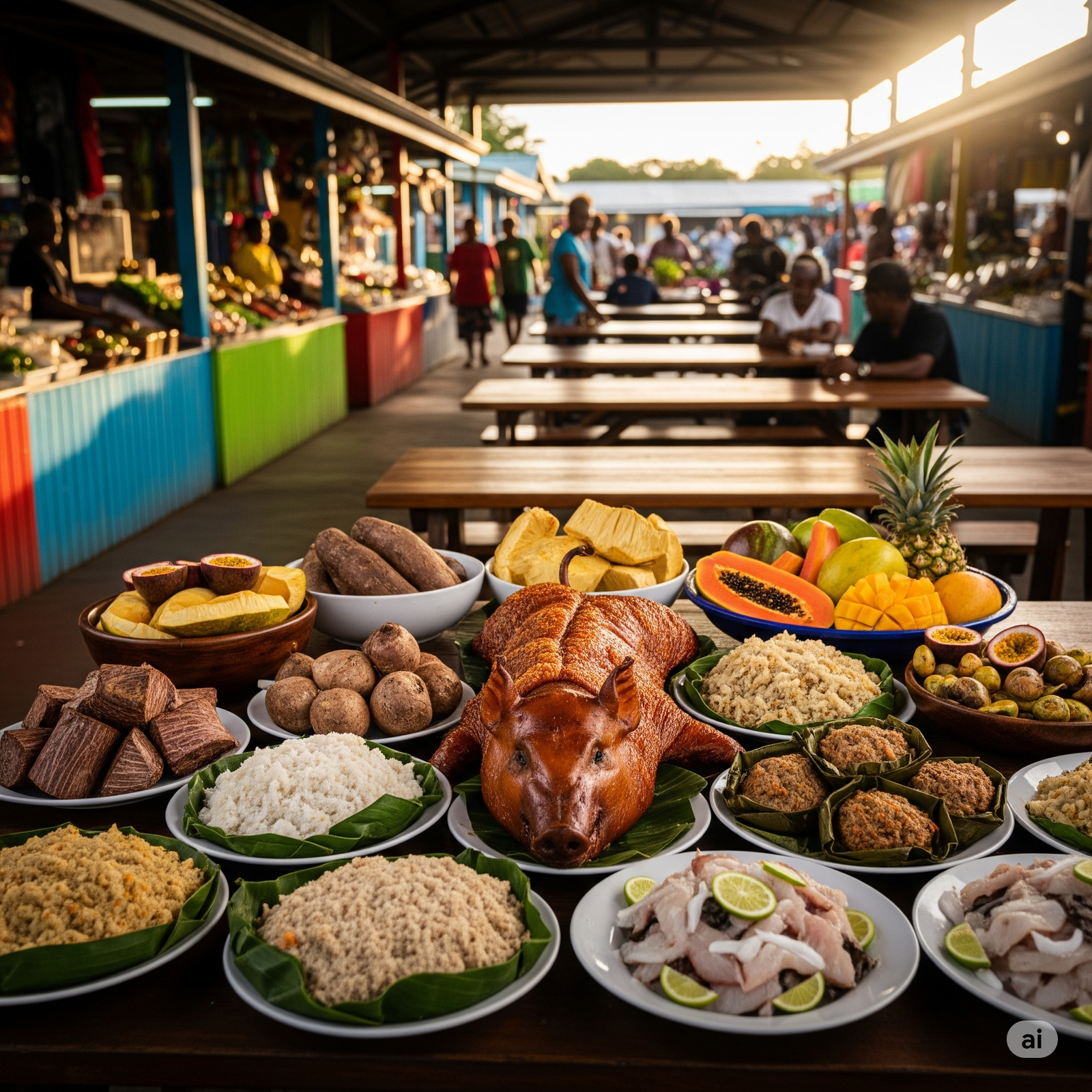In Vanuatu, where the vibrant pulse of Kastom (traditional customs) beats strongly and the land provides generously, the rhythm of life for many still revolves around the earth. Far removed from the industrialized agriculture of the West, a ni-Vanuatu (the people of Vanuatu) farmer lives a life deeply entwined with nature, community, and the profound satisfaction of self-sufficiency.
Let’s step into a typical day for a farmer in one of Vanuatu’s many islands, where ancient practices meet modern necessities, and every sunrise brings a fresh opportunity to connect with the land.
The Dawn Chorus: A Gentle Awakening
The day begins not with an alarm clock, but with the symphony of the island. Roosters crow, birds begin their chirping chorus, and the soft light of dawn filters through the palm fronds. The air is cool and fresh, carrying the scent of dew-kissed earth.
Before the sun climbs too high, families gather for a simple breakfast – perhaps some leftover roasted root crops from the previous night, fresh coconut water, or tropical fruits gathered from nearby trees. Plans for the day’s work in the garden (often referred to as “the bush” or “garden”) are discussed, often as a collective effort involving several family members.
Into the Garden: Sustenance from the Earth
As the sun begins to warm the air, the farmer, often with a bush knife (machete) slung at their side and a digging stick in hand, makes their way to the family garden. These aren’t vast, monoculture fields, but rather diverse plots tucked into the fertile landscape, often practicing intercropping and shifting cultivation to maintain soil health.
The morning hours are dedicated to essential tasks:
- Harvesting: Ripe taro, yam, cassava, kumala (sweet potato), and manioc are carefully dug from the earth. These starchy root crops are the staples of the ni-Vanuatu diet. Bananas, pawpaws, and other seasonal fruits might also be collected.
- Planting & Weeding: New cuttings or sprouts are strategically placed, ensuring a continuous supply of food. Weeds are meticulously cleared by hand, a testament to patience and a deep understanding of the local flora.
- Preparing the Land: For new plots, larger bush knives or axes might be used to clear dense vegetation, always mindful of preserving useful trees and respecting sacred sites.
The work is physical, done under the warming sun, often with the casual chatter of family members or neighbors working nearby. It’s a testament to manual labor, passed down through generations, making the bounty of the land truly earned.
Midday Respite: Fueling the Body, Nourishing the Soul
As the tropical heat peaks, work in the garden slows. The family might gather under the shade of a large tree for a midday meal. This often consists of freshly harvested root crops, perhaps a piece of local fish or chicken (if available), and plenty of fresh coconut water.
This break isn’t just for eating; it’s a time for rest, storytelling, and connecting. Children might play nearby, laughter mixes with the rustle of leaves, and the sense of community is palpable. There’s little rush; the rhythm is dictated by the sun and the needs of the earth.
Afternoon Rhythms: Beyond the Main Crops
The afternoon might see a return to the garden for more specialized tasks, or attention might shift to other crucial activities:
- Cash Crops: If the family cultivates cash crops like kava (a ceremonial drink), coffee, or cacao, time might be spent tending to these, preparing them for market, or processing them (e.g., drying kava roots).
- Animal Care: Small livestock like pigs or chickens, which roam freely, might need attention.
- Fishing or Foraging: Coastal communities might head to the reef for fishing or foraging for shellfish, adding fresh protein to the diet. Inland, collecting wild nuts or medicinal plants might be part of the routine.
- Village Life: Attending a village meeting, assisting a neighbor, or participating in a community project.
The pace is deliberate, and decisions are often made collaboratively, reflecting the communal spirit of ni-Vanuatu society. Unexpected rain showers might send everyone scrambling for shelter, only to resume work once the skies clear.
The Evening Hearth: Family and Kastom
As the sun dips towards the horizon, casting long shadows across the landscape, the family returns home. Fires are stoked, and the preparation of the evening meal begins. This is often the largest meal of the day, a hearty affair featuring the day’s fresh harvest, perhaps cooked with coconut cream or wrapped in banana leaves and roasted in an earthen oven (laplap).
Evenings are for family. Stories are shared, lessons are taught, and sometimes, the melodic strains of a ukulele or the rhythmic beats of a tamtam (slit drum) fill the air. It’s a time for reflection, gratitude, and reinforcing the bonds that hold the community together.
Sustenance, Simplicity, and Soul
The day of a ni-Vanuatu farmer is one of continuous effort, but also profound connection. It’s a life dictated by the seasons, the weather, and the needs of the community, not by clocks or corporate demands. It speaks volumes about resilience, self-sufficiency, and a deep, abiding respect for the land that provides everything. It’s a powerful reminder of how much we can learn from a life lived in harmony with nature’s timeless rhythms.


Leave a Reply